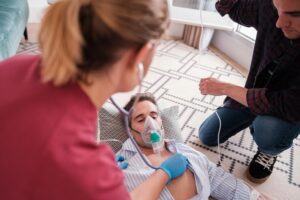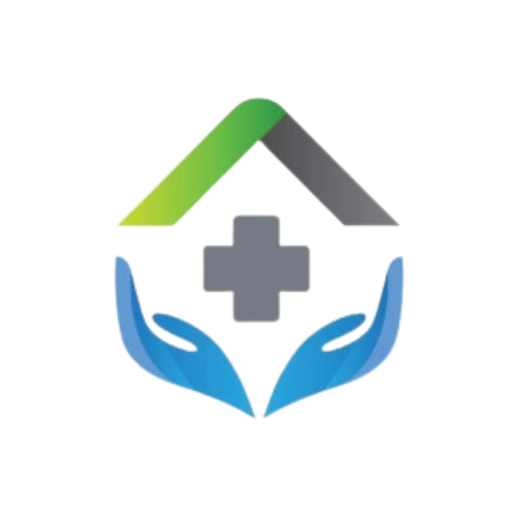Managing Medical Emergencies at Home for Elderly Care
Hey there! Accidents and sudden illnesses can happen anytime, especially when caring for older loved ones. Imagine your grandma suddenly slipping in the kitchen or grandpa feeling short of breath – do you know what to do? Staying calm and prepared is key. In fact, studies show more than 25% of older adults fall each year, and many emergency situations happen at home. That’s why knowing how to act quickly and safely matters so much. In this guide, we’ll walk you through what counts as an emergency, common home accidents (and how to handle them!), when to call for help, and how to set up your home for safety. You’ve got this – let’s dive in together!

What Counts as a Medical Emergency at Home?
Some situations at home are serious and need immediate help. If you see any of these red flags, don’t hesitate to call for professional help (like dialing 1122 in Lahore or 911 where you are):
-
Chest pain or heart symptoms: Sudden chest discomfort, pressure, or pain that spreads to arms or jaw is a big warning sign. Similarly, if someone suddenly has severe shortness of breath or starts wheezing, get help right away.
-
Severe bleeding: If blood is spurting or won’t stop flowing from a wound, that’s an emergency. Apply firm pressure and call emergency services immediately.
-
Stroke signs (FAST): Watch for any Face drooping, one arm that is weak or can’t lift, or Speech difficulty (slurred or strange speech). If you see any of these FAST signs, treat it as an emergency.
-
Loss of consciousness: If someone passes out, is unresponsive, or has a sudden seizure, call for help right away.
-
Major burns: Deep burns, large burns (bigger than a few inches), or burns on the face/hands/genitals need emergency care.
-
Difficulty breathing or choking: If someone can’t breathe or is choking on food and can’t cough it out, do first aid (Heimlich maneuver/back blows) and call for help.
In short, any sudden new severe symptom (chest pain, trouble breathing, heavy bleeding, stroke-like changes, confusion or collapse) should be treated as an emergency. When in doubt, it’s safer to call an ambulance or emergency number.
Common Emergencies and What to Do
Let’s look at some real-life scenarios and how you can help:
-
Falls: One of the most common accidents for seniors is a fall. If a person falls, first stay calm. If they are not hurt and feel OK, help them get up slowly. For example, roll them onto their side, then have them push up with their arms onto a sturdy chair or bed. Take it step-by-step and let them catch their breath. If they feel pain, can’t move, or you suspect a broken bone, do not try to lift them. Instead, keep them warm and call for help immediately.
-
Cuts and Bleeding: For a minor cut, wash the area gently with soap and water, then cover it with a clean bandage. But if the cut is deep or bleeding a lot, press firmly on the wound with a cloth or bandage to slow the bleeding. Keep pressure on the wound and call emergency services right away if the bleeding doesn’t stop or if the person feels faint. (Do not remove any large objects stuck in a wound; press around them instead.)
-
Burns: If someone gets a small burn (like touching a hot pan), immediately cool the area under cool running water for about 10 minutes. Then gently pat it dry and cover with a clean, loose bandage. Give the person an over-the-counter pain reliever if they’re comfortable with it. However, major burns (deep, very painful, or covering a large area) are an emergency. If you see black or white patches on the skin, or the burn is larger than a few inches, call for help at once.
-
Choking/Breathing problems: If someone is choking (gasping, unable to talk, or turning blue), encourage them to cough if they can. If coughing doesn’t clear it, give five sharp back blows and then five abdominal thrusts (Heimlich maneuver) to try to dislodge the object. Keep alternating until help arrives. If they lose consciousness, start CPR if you know how, and call emergency. For other breathing issues (like a bad asthma attack), sit them upright, loosen tight clothing, use their inhaler if they have one, and call emergency services if they can’t breathe normally.
-
Low blood sugar (Hypoglycemia): Diabetic seniors can have an emergency if their blood sugar drops too low. If someone is shaky, sweaty, confused, or weak (signs of low sugar), give them a quick snack with sugar – for example, ½ cup of juice, a spoonful of honey, or 3–4 glucose tablets (about 15 grams of sugar). Then wait 15 minutes and check again. If the sugar is still low, repeat. Keep doing this until they improve. Important: If the person becomes unconscious or can’t swallow, do not try to feed them. Instead, call an ambulance immediately. If they have a glucagon emergency kit (prescribed for severe lows), use it and get medical help.
-
Heart attack or stroke signs: If someone suddenly has chest pain (pressure, squeezing, or heaviness) that doesn’t go away with rest, or they feel pain in their arm, jaw, or back, think “heart attack.” Also watch for nausea, cold sweat or lightheadedness. And remember FAST for strokes: drooping face, weak arm, slurred speech. If you see any of these stroke signs, call emergency right away. Every minute counts, so act fast and stay calm.
For each of these emergencies, keep calm, talk soothingly to the senior, and do what you can (press on wounds, cool burns, etc.) while waiting for help. Never ignore severe symptoms like loss of consciousness, heavy bleeding, or chest pain – it’s better to be safe and get professional help.
When to Call Professional Help vs Handling at Home
A key question is knowing when something can stay home and when it needs an ambulance or doctor. Call for help when it’s life-threatening or very serious. For example:
-
Always call if there is chest pain, trouble breathing, heavy bleeding, severe burns, broken bones, or if the person is unconscious or passing out.
-
Also call if you see stroke symptoms (droop, slur, paralysis).
-
Even if you’re not 100% sure, it’s safer to call. Emergency teams would rather check and find it’s not serious than have you wait and things get worse.
On the other hand, small problems you can often manage at home. For instance, a tiny scrape or bruise can be cleaned and bandaged on the spot. A mild sunburn or a small bump may just need ice and observation. If an elderly person has mild nausea or a low-grade fever, you might monitor them with home care unless it gets worse.
Here’s a quick guide: Call (get professional help) for the big red-flag emergencies; Handle at home for very minor cuts or bumps. If in doubt, call anyway – you’re protecting your loved one’s health.
Tips to Prepare Your Home for Emergencies
Preparation makes emergencies much easier to handle. Here are some simple steps you can do now:
-
Keep emergency numbers handy: Post the ambulance number (1122 in Lahore), your doctor’s number, and a nearby hospital contact by every phone or on the fridge. Make sure everyone can read the list quickly in a crisis. Also include a neighbor or family member who can come help if needed.
-
Stock a first aid kit: Have a well-stocked kit in an obvious place (like under the kitchen sink or a medicine cabinet). Include bandages, antiseptic wipes, gauze, adhesive tape, scissors, gloves, a thermometer, burn cream or aloe vera, and a flashlight. Keep the kit visible and tell family/visitors where it is. Check every few months to replace used or expired items.
-
Organize medications: Keep a current list of all medicines (with doses) and allergies in the kit or on the fridge. Also store extra essential pills and medical supplies in one spot. In an emergency, this helps first responders or visiting nurses know what’s needed.
-
Clear paths and prevent falls: Remove clutter or cords from floors and hallways. Make sure rooms are well-lit, especially at night. Tape down loose rugs or remove them. Install handrails on stairways and grab bars in the bathroom for stability. Use non-slip mats in showers and wear good-fitting slippers or shoes indoors.
-
Check alarms and detectors: Install smoke detectors and carbon monoxide detectors on every floor and test them monthly. Replace batteries twice a year (a good rule is to do it when clocks change). These alarms save lives by warning you of fire or gas before you notice.
-
Prepare personal alerts: Consider a wearable emergency button or bracelet for seniors. If they fall or need help and can’t reach the phone, pressing it will automatically call for emergency assistance.
-
Know basic first aid: Take a free first aid or CPR class (some local hospitals or community centers offer these). Even knowing how to “stop bleeding” or “cool a burn” can make you feel confident.
With a bit of planning, you can turn your home into a safer place. A prepared home (clear and well-equipped) plus a prepared mind (knowing what to do) goes a long way.
How Home Nursing Services in Lahore Can Help
You don’t have to face emergencies alone. Professional home nursing services can be a huge help and comfort. For example, Shumaya Home Care & Patient Services offers trained nurses and caregivers who can come right to your door. Here’s how they make a difference:
-
Expert medical care at home: Shumaya’s Home Nursing Services bring skilled nurses to your home for things like giving IV fluids, changing wounds or burns dressings, managing medications, and monitoring vitals. In an emergency, having a nurse there can mean faster, safer care for your loved one.
-
Specialized elderly support: Their Elderly Care Service provides help with daily activities (like bathing, eating, moving around) and ensures seniors follow their health plans. Caregivers also remind them to take medicines on time and keep an eye on any warning symptoms. This ongoing support lowers the chance that a small problem turns into a big emergency.
-
Companionship and calm: Sometimes emergencies happen when an older person is alone. A trained attendant from Shumaya can stay with your loved one, so there’s always someone attentive on the spot. This can be life-saving if the person can’t reach a phone in time.
-
Coordination with doctors: These home care professionals know when to escalate. If they notice warning signs during a routine check, they’ll advise calling a doctor or ambulance right away. They act as an extra set of eyes and hands.
Basically, having home nursing services in Lahore from Shumaya means medical care comes to you. It takes a lot of stress off the family – you’ll know an experienced nurse is there if the worst happens. (Psst: check their Patient Attendant Service and Home Nursing Services pages to learn more about their offerings.)
Frequently Asked Questions
(Same as before – already source-free)
Quick Recap and Encouragement
You’ve made it through a lot of information, so here’s the bottom line: Stay calm, be prepared, and you’ll help your loved one get through almost anything. Watch for big warning signs (chest pain, heavy bleeding, stroke symptoms, choking, etc.) and call for help if you see them. For smaller injuries, you can often give first aid at home safely. Remember to keep a first aid kit and emergency numbers on hand, clear your home of hazards, and consider home nursing support from a team like Shumaya’s if needed.
Dealing with an emergency can feel scary, but you’re not alone — you are your loved one’s best advocate. With some knowledge and quick action, you can help them stay safe and calm. You’ve got this!


